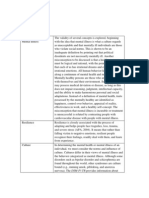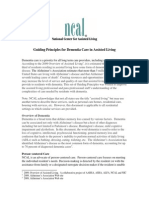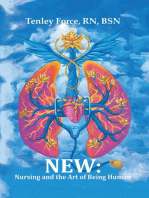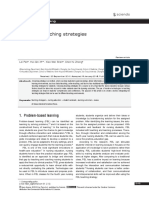0 ratings0% found this document useful (0 votes)
204 viewsCommunity Case: Faith-Based Community
Community Case: Faith-Based Community
Uploaded by
Fatima G ReyesThe document discusses a case involving a 56-year-old man named Darnell who has a terminal diagnosis of late-stage colon cancer. A home health nurse visits Darnell and his wife to discuss available support systems and potentially arrange for hospice care. The document also answers questions about end-of-life nursing interventions, hospice admission criteria, the philosophy of hospice care, and the roles of nurses in hospice care versus palliative care.
Copyright:
© All Rights Reserved
Available Formats
Download as DOCX, PDF, TXT or read online from Scribd
Community Case: Faith-Based Community
Community Case: Faith-Based Community
Uploaded by
Fatima G Reyes0 ratings0% found this document useful (0 votes)
204 views1 pageThe document discusses a case involving a 56-year-old man named Darnell who has a terminal diagnosis of late-stage colon cancer. A home health nurse visits Darnell and his wife to discuss available support systems and potentially arrange for hospice care. The document also answers questions about end-of-life nursing interventions, hospice admission criteria, the philosophy of hospice care, and the roles of nurses in hospice care versus palliative care.
Original Title
Community
Copyright
© © All Rights Reserved
Available Formats
DOCX, PDF, TXT or read online from Scribd
Share this document
Did you find this document useful?
Is this content inappropriate?
The document discusses a case involving a 56-year-old man named Darnell who has a terminal diagnosis of late-stage colon cancer. A home health nurse visits Darnell and his wife to discuss available support systems and potentially arrange for hospice care. The document also answers questions about end-of-life nursing interventions, hospice admission criteria, the philosophy of hospice care, and the roles of nurses in hospice care versus palliative care.
Copyright:
© All Rights Reserved
Available Formats
Download as DOCX, PDF, TXT or read online from Scribd
Download as docx, pdf, or txt
0 ratings0% found this document useful (0 votes)
204 views1 pageCommunity Case: Faith-Based Community
Community Case: Faith-Based Community
Uploaded by
Fatima G ReyesThe document discusses a case involving a 56-year-old man named Darnell who has a terminal diagnosis of late-stage colon cancer. A home health nurse visits Darnell and his wife to discuss available support systems and potentially arrange for hospice care. The document also answers questions about end-of-life nursing interventions, hospice admission criteria, the philosophy of hospice care, and the roles of nurses in hospice care versus palliative care.
Copyright:
© All Rights Reserved
Available Formats
Download as DOCX, PDF, TXT or read online from Scribd
Download as docx, pdf, or txt
You are on page 1of 1
Community Case: Faith-Based Community
Case Part 1
Darnell, who is 56 years old, is of African American heritage and has a diagnosis of late-
stage colon cancer. His physician has indicated that there are no additional medical
interventions to treat the condition. The physician has contacted the home health agency
and requested that a nurse visit the family. Amy, a home health nurse from the AOM
Home Health Agency, visits Darnell and his wife, Carlene, to discuss their available
support systems and possibly arrange for Darnell to have hospice care services.
Questions for students:
1. For individuals with a terminal diagnosis, what end-of-life nursing interventions
can contribute to a meaningful quality of life?
The end-of-life nursing interventions that contribute to a meaningful quality of
life to provide open communication for discussion with the patient and family
members about his/her wishes concerning wills, burial arrangements, tissue
donation, insurance. Provide patient with time for family gatherings and how to
spend the remaining time. Determine spiritual needs of the patient and refer them
to spiritual advisor or parish members.
2. What are the admission criteria for hospice care? Does it sound like Darnell meets
these criteria?
The admission criteria for hospice care is that the patient has 6 or less months to
live and no more treatments can be given to the patient. Darnell meets the criteria
because his physician has indicated there are no additional medical interventions
to threat the condition.
3. What is the philosophy of hospice care? Where are hospice services provided
(e.g., the home, an institution, other)?
The philosophy of hospice care is that it is a type of care that is designed to help
clients and their families during the final stages of a terminal illness. Hospice
treatment is concentrated primarily on maintaining comfort. Hospice services are
provided at home, assisted living or extended care facilities, or hospice inpatient
units.
4. What role do nurses have in hospice care? Compare this with the provision of
palliative care nursing interventions in general practice.
The role of nurses have in hospice care to accommodate the patient and family
wishes to reduce anxiety and promote sense of peace. Hospice care goals are to
give supportive care rather than cure. Alleviate their distress and enhance their
coping. Palliative care is specialize medical care by providing relief from the
symptoms and stress of the illness. Palliative care is based on the needs of the
patient and no on the patient’s prognosis.
From Lippincott CoursePoint for Community and Public Health Nursing. © Wolters Kluwer.
You might also like
- Final Family Interview and Assessment PaperDocument8 pagesFinal Family Interview and Assessment Paperapi-542033819100% (2)
- AMSN Scope Standards MS NursingDocument27 pagesAMSN Scope Standards MS NursingPaulEspartinezNo ratings yet
- World Greatest Strategists - Ma HuatengDocument2 pagesWorld Greatest Strategists - Ma Huatengjojie dador100% (1)
- Hospice Care (End of Life Care) For Terminal Illness - Case Study SampleDocument19 pagesHospice Care (End of Life Care) For Terminal Illness - Case Study Samplepeng kulongNo ratings yet
- Community Nursing HESI Study GuideDocument2 pagesCommunity Nursing HESI Study Guidebrittanyann1033% (3)
- Professional Development PlanDocument9 pagesProfessional Development Planapi-533828062No ratings yet
- Argumentative EssayDocument3 pagesArgumentative Essayapi-439697272No ratings yet
- Community Assessment PaperDocument6 pagesCommunity Assessment Paperapi-543558169No ratings yet
- CouponDocument17 pagesCouponDapo KingNo ratings yet
- Soal Yang Sering Muncul Di MTCNA MikroTikDocument4 pagesSoal Yang Sering Muncul Di MTCNA MikroTikdestu kurniadi88% (8)
- Introduction To Palliative Care NursingDocument3 pagesIntroduction To Palliative Care NursingAbigail LonoganNo ratings yet
- Journal of Surgical NurseDocument8 pagesJournal of Surgical NurseWahyu WeraNo ratings yet
- End of Life CareDocument25 pagesEnd of Life CareMeenu DograNo ratings yet
- End-Of-Life Decision Making Across CulturesDocument15 pagesEnd-Of-Life Decision Making Across CulturesPamNo ratings yet
- Family Health Assessment Part I PDFDocument10 pagesFamily Health Assessment Part I PDFsszabolcsiNo ratings yet
- Health Assessment LectureDocument115 pagesHealth Assessment LectureteuuuuNo ratings yet
- An Academic Nurse’s Tale: Triumphs, Tribulations, and TravelsFrom EverandAn Academic Nurse’s Tale: Triumphs, Tribulations, and TravelsNo ratings yet
- Oral Drug Administration Workbook 2019Document26 pagesOral Drug Administration Workbook 2019Jessilen Consorte Nidea DexisneNo ratings yet
- Freidman Family AssessmentDocument3 pagesFreidman Family AssessmentDawn Targon50% (2)
- Nursing Care Plan #1 Mental HealthDocument13 pagesNursing Care Plan #1 Mental HealthNursyNurseNo ratings yet
- NCM 114 Mod2Document6 pagesNCM 114 Mod2Samantha BolanteNo ratings yet
- Nurse PractitionersDocument6 pagesNurse PractitionersJakeGilNo ratings yet
- Antepartum Nursing Assessment 2012Document56 pagesAntepartum Nursing Assessment 2012Eldrick PilandoNo ratings yet
- Nursing Credentials and CertificationsDocument8 pagesNursing Credentials and CertificationsmhaymunezNo ratings yet
- Vacarolis Chapter OutlinesDocument181 pagesVacarolis Chapter Outlinesamashriqi100% (1)
- Guiding Principles Dementia CareDocument9 pagesGuiding Principles Dementia CareGinaGillisNo ratings yet
- Prognosis Hope: A Care Givers and Care Seekers Guide to Empowered CareFrom EverandPrognosis Hope: A Care Givers and Care Seekers Guide to Empowered CareNo ratings yet
- Advance Care Planning-Malaysian Hospice Congress - DR Wu Huei YawDocument42 pagesAdvance Care Planning-Malaysian Hospice Congress - DR Wu Huei Yawmalaysianhospicecouncil6240No ratings yet
- Final Reflective Journal 2019 1Document2 pagesFinal Reflective Journal 2019 1api-456438568No ratings yet
- Hospice CareDocument2 pagesHospice CareSamuel YoungNo ratings yet
- Strategies for Awareness & Prevention of Hiv/Aids Among African-Americans: A Hand BookFrom EverandStrategies for Awareness & Prevention of Hiv/Aids Among African-Americans: A Hand BookNo ratings yet
- Alcoholics Anonymous Paper Kelly RyanDocument4 pagesAlcoholics Anonymous Paper Kelly Ryanapi-308635418No ratings yet
- Nursing Pharmacolocy Part 2Document176 pagesNursing Pharmacolocy Part 2TkNo ratings yet
- Nurse PractitionerDocument6 pagesNurse Practitionerapi-277501628100% (1)
- Mary C. Townsend Karyn I.morgan - Pocket Guide To Psychiatric Nursing (20-680-713Document34 pagesMary C. Townsend Karyn I.morgan - Pocket Guide To Psychiatric Nursing (20-680-713Fadya alzi kaizarianiNo ratings yet
- Delfinm QsenDocument57 pagesDelfinm Qsenapi-346220114No ratings yet
- Home and Palliative Care FinalDocument41 pagesHome and Palliative Care Finalpeca65No ratings yet
- Utilization Review RNDocument2 pagesUtilization Review RNapi-121451258No ratings yet
- Telephonic RN Case ManagerDocument2 pagesTelephonic RN Case Managerapi-78703590No ratings yet
- Palliative NursingDocument31 pagesPalliative NursingNyein MohNo ratings yet
- WWW - Incar.tw-Family Nurse Practitioner Exam Secrets Study Guide NP Test Review For The Nurse Practitioner Exam PDFDocument5 pagesWWW - Incar.tw-Family Nurse Practitioner Exam Secrets Study Guide NP Test Review For The Nurse Practitioner Exam PDFGustavo Adolfo RuizNo ratings yet
- Family AssessmentDocument7 pagesFamily Assessmentapi-267488377No ratings yet
- Ethical Issues in Pediatric AnesDocument16 pagesEthical Issues in Pediatric AnesrejNo ratings yet
- Family Assessment PaperDocument16 pagesFamily Assessment Paperapi-231899545100% (1)
- Hmong CultureDocument14 pagesHmong CulturepolotgrNo ratings yet
- Palliative and Hospice Care Nursing Online QuizDocument1 pagePalliative and Hospice Care Nursing Online Quizjanna mae patriarcaNo ratings yet
- Feature StoryDocument5 pagesFeature Storyapi-586108255No ratings yet
- Cellulitis: Current Insights Into Pathophysiology and Clinical ManagementDocument13 pagesCellulitis: Current Insights Into Pathophysiology and Clinical Managementtucto849915No ratings yet
- Registered Nurse Shortage in Rural Healthcare SettingsDocument9 pagesRegistered Nurse Shortage in Rural Healthcare SettingsShelley KrumwiedeNo ratings yet
- Culturally Competent Nursing Care and Promoting Diversity in Our Nursing WorkforceDocument6 pagesCulturally Competent Nursing Care and Promoting Diversity in Our Nursing WorkforceDiahsadnyawatiNo ratings yet
- Addiction in the Lives of Registered Nurses and Their Wake-Up Jolt to RecoveryFrom EverandAddiction in the Lives of Registered Nurses and Their Wake-Up Jolt to RecoveryNo ratings yet
- Rheumatology Nursing: A Creative ApproachFrom EverandRheumatology Nursing: A Creative ApproachJackie HillNo ratings yet
- Ashleigh Bruno-Coxs Nursing ResumeDocument1 pageAshleigh Bruno-Coxs Nursing Resumeapi-449721212No ratings yet
- The Caregiver's Guidebook: Your Resource for Successfully Navigating Your Life as a CaregiverFrom EverandThe Caregiver's Guidebook: Your Resource for Successfully Navigating Your Life as a CaregiverNo ratings yet
- Final Learning Plan - PsychiatryDocument5 pagesFinal Learning Plan - Psychiatryapi-254345179No ratings yet
- Personal Philosophy Paper FinalDocument9 pagesPersonal Philosophy Paper Finalapi-539502057No ratings yet
- Toolbox of Teaching Strategies: 1. Problem-Based LearningDocument7 pagesToolbox of Teaching Strategies: 1. Problem-Based LearningMaria CequenaNo ratings yet
- Getting Real About Caring: What I Discovered About Authentic Caring as a Nurse Leader and One Step ForwardFrom EverandGetting Real About Caring: What I Discovered About Authentic Caring as a Nurse Leader and One Step ForwardNo ratings yet
- Jmu NSG 325 Formal Paper-2Document10 pagesJmu NSG 325 Formal Paper-2api-532728319No ratings yet
- KNTECH Product CatalogDocument13 pagesKNTECH Product CatalogArioNo ratings yet
- Code-Switching and Identity Construction Among Chinese-Filipino YouthDocument11 pagesCode-Switching and Identity Construction Among Chinese-Filipino YouthCzandrea ŚantösNo ratings yet
- Unit 01 The Business Environment Sample Assessment MaterialDocument33 pagesUnit 01 The Business Environment Sample Assessment MaterialSneha HiraniNo ratings yet
- Navatara Chakra: March 1, 2013Document1 pageNavatara Chakra: March 1, 2013indians jonesNo ratings yet
- Profile of Philippine Tariff SystemDocument43 pagesProfile of Philippine Tariff SystemTravis Opiz100% (1)
- Computers & Education: Charles Calderwood, Phillip L. Ackerman, Erin Marie ConklinDocument11 pagesComputers & Education: Charles Calderwood, Phillip L. Ackerman, Erin Marie ConklinLeonardo MonteiroNo ratings yet
- Advances in Food and Nutrition Research 49 1st Edition Steve Taylor Download PDFDocument82 pagesAdvances in Food and Nutrition Research 49 1st Edition Steve Taylor Download PDFcolynsatas100% (2)
- Ben Cassen and The Development of The Rectilinear ScannerDocument6 pagesBen Cassen and The Development of The Rectilinear ScannerTuấn Hồ TrọngNo ratings yet
- CPRA X CPR NotesDocument114 pagesCPRA X CPR NotesGrace RoqueNo ratings yet
- Robinson, Wright, 2013Document10 pagesRobinson, Wright, 2013apanek930No ratings yet
- 2011-12-20 Rothstein Scott PMDocument154 pages2011-12-20 Rothstein Scott PMmatthendleyNo ratings yet
- WAVEX Abstract Book FinalDocument35 pagesWAVEX Abstract Book FinalAlessandro PinNo ratings yet
- 9212 Stressed MicroorganismsDocument3 pages9212 Stressed MicroorganismsCalidad LassNo ratings yet
- Ae Notes 2Document275 pagesAe Notes 2Knowledge Mist ChannelNo ratings yet
- Ehyehi BhagawanDocument3 pagesEhyehi BhagawanJayanthiNo ratings yet
- PGP Retirement Planning UnlockedDocument9 pagesPGP Retirement Planning UnlockedBharathi 3280No ratings yet
- Expanded ResimeDocument2 pagesExpanded Resimeapi-254710132No ratings yet
- Multiscan P1Document2 pagesMultiscan P1mohhizbarNo ratings yet
- E4l Beg Gapped Ep3Document1 pageE4l Beg Gapped Ep3Alan FerreiraNo ratings yet
- Law of The Sea - October 21-23, 2013Document39 pagesLaw of The Sea - October 21-23, 2013Dhruv AghiNo ratings yet
- Product Offer For TelecommunicationsDocument84 pagesProduct Offer For TelecommunicationsisfaroNo ratings yet
- Ias General Studies Prelim 2010 Question Paper Answer Vision IasDocument34 pagesIas General Studies Prelim 2010 Question Paper Answer Vision IasHarsh VikramNo ratings yet
- Elzbieta Siepak ZMBM 2001 Sanctuary of The Divine Mercy in CracowDocument15 pagesElzbieta Siepak ZMBM 2001 Sanctuary of The Divine Mercy in Cracowisabel correaNo ratings yet
- Bahasa InggrisDocument12 pagesBahasa InggrisFajar Jauhari ShefryantoNo ratings yet
- 3 - Cloud ComputingDocument4 pages3 - Cloud ComputingAchmad ArdiNo ratings yet
- Rozzano Locsin-Technological Competency As Caring in NursingDocument5 pagesRozzano Locsin-Technological Competency As Caring in NursingAmy SpamNo ratings yet
- Portfolio Reflection 1Document3 pagesPortfolio Reflection 1api-290638637No ratings yet
- ArticleDocument14 pagesArticleBEALU GIRMAYENo ratings yet

























































































